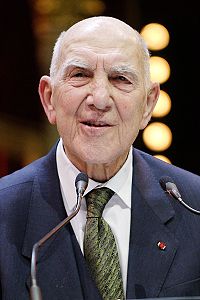Stéphane Hessel
| Stéphane Hessel | |
|---|---|

Stéphane Hessel at a political rally for Europe Écologie, March 2010
|
|
| Born |
Stéphane Frédéric Hessel 20 October 1917 Berlin, German Empire |
| Died | 26 February 2013 (aged 95) Paris, France |
| Residence | Paris, France |
| Citizenship | French |
| Occupation | Diplomat, ambassador |
| Years active | 1946–2013 |
| Known for |
Human Rights advocacy French Resistance member Buchenwald survivor |
| Notable work |
Time for Outrage! (Indignez-vous!) |
| Spouse(s) | Vitia Guetzevich (1939-1986; 3 children) Christiane Hessel-Chabry (1987-) |
| Parent(s) | Helen Grund Hessel Franz Hessel |
| Awards |
Légion d'honneur Ordre du Mérite North-South Prize UNESCO/Bibao Prize |
Stéphane Frédéric Hessel (20 October 1917 – 26 February 2013) was a diplomat, ambassador, writer, concentration camp survivor, French Resistance member and BCRA agent. Born German, he became a naturalised French citizen in 1939. He became an observer of the editing of the Universal Declaration of Human Rights of 1948. In 2011 he was named by Foreign Policy magazine in its list of top global thinkers. In later years his activism focused on economic inequalities, the Israeli/Palestinian conflict and protection for the post-World War II social vision. His short book Time for Outrage! sold 4.5 million copies worldwide. Hessel and his book were linked and cited as an inspiration for the Spanish Indignados, the American Occupy Wall Street movement and other political movements.
Hessel was born in Berlin, the son of Helen (born Grund), a journalist, and writer Franz Hessel, who inspired the characters of Jules and Kathe in Henri-Pierre Roché's novel Jules and Jim (Kathe was called Catherine in the subsequent film adaptation by François Truffaut). His paternal grandparents were Jewish immigrants who joined the Lutheran church, and his mother was from a Christian family. Hessel emigrated to Paris with his parents in 1924. Having received his baccalauréat when 15 years old, he was eventually admitted in 1939 to the École Normale Supérieure. He became a naturalized French citizen in 1939, before being mobilized later that year into the French army in Saint-Maixent-l'École. His first wife, Vitia, was the daughter of Boris Mirkin-Getzevich.
...
Wikipedia
